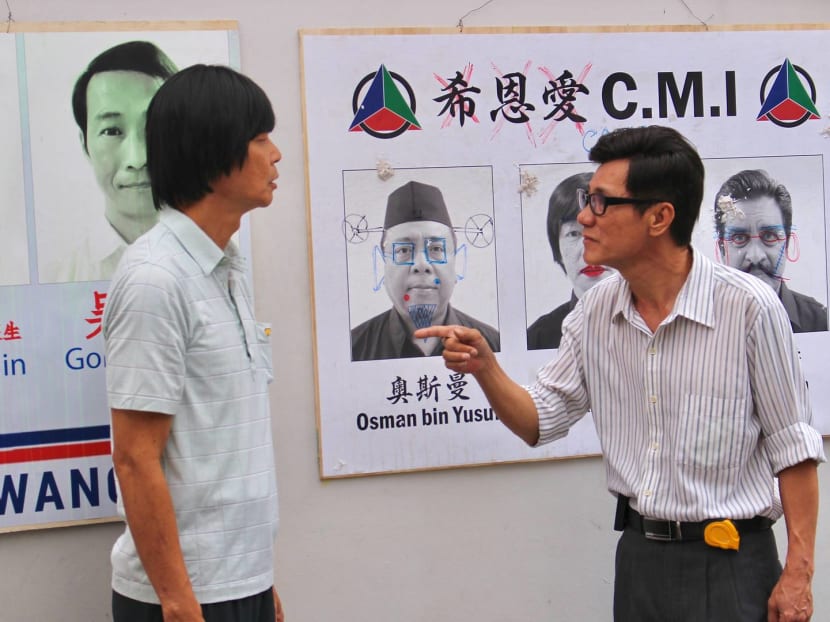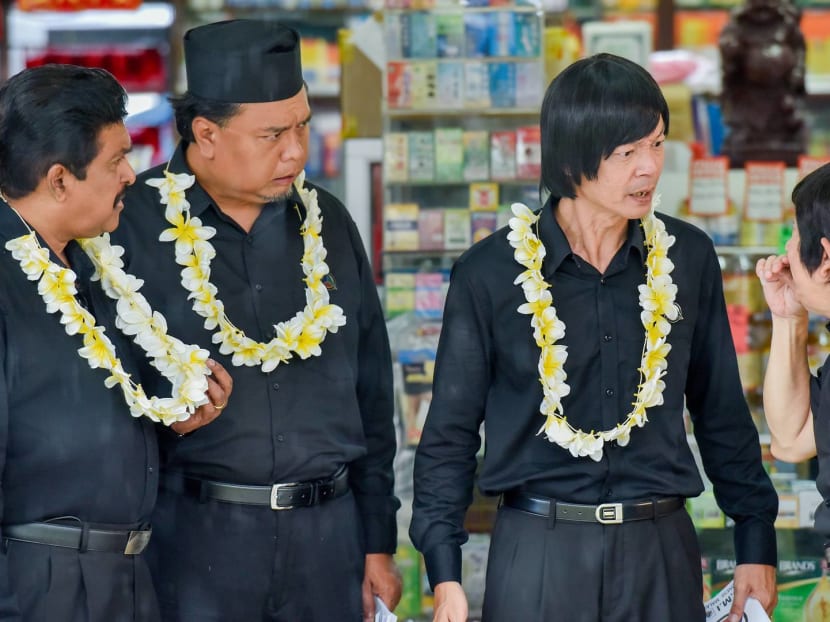The Diam Diam Era Two Review: Jack Neo Tackles 1988 Election Fever In Shallow And Unfunny Sequel
They should've called this 'The Diam Diam Era 1.5'.
Starring Mark Lee, Henry Thia, Richie Koh, Danny Lee
Directed by Jack Neo
Okay, it's official.
The Diam Diam Era Two is Jack Neo's most political film.
It's, in fact, so official that this comedy-drama — a predictable, simplistic half-hour TV-ish episode stretched out into an unsubtle, largely unfunny cinematic protuberance — even has its own fictitious opposition party dubbed “CMI Party”. Chinese-Malay-Indian Party, geddit?
Along with its own logo (an arrowhead symbol which looks kinda ripped off from a real party's, the SDP), its own catchy slogan — “We must change Singapore” — and most blatantly, with a combo of things real and concocted, its own version of local history.
Er, change Singapore into what? We don’t really know since the party members here are caricatured as a disgruntled lot of under-educated, local-speaking, anti-elite chronic grumblers.

Let's agree to disagree: Mark Lee talks post-election blues with Wang Lei.
In their unfamiliar English language-dominated new nation, they feel severely disadvantaged and are seriously pissed off by their social displacement without offering any discernible solutions. So they protest loudly and gloriously gullibly at the elections. Sorta like those mad QAnon nuts from Trumpland. But with grouses based more on real redundancy than fake conspiracy.
Now, I actually believe that Neo, whenever he harps on the plight of the left-behind in his stories — which is pretty often in some manner or other — is doing a necessary public service by giving them a voice. Problem is, this time, that KPKB (kow peh kow bu — “complain father, complain mother” in English) voice is just too shrill and worn out as it overstays its well-intentioned point.
Even worse, Neo's lopsided portrayal of opposition politics here is based on the lowest common denominator of the most uninformed complainer garnered from the kopitiam. Meaning, somebody who’s resentful primarily for the sake of being resentful.
Maybe Neo feels that this reflects the masses back then. But the film’s depiction of a ragtag band of simpleton-dissenters marching down the streets in black uniforms looking like either a bunch of fascists or ISIS super fans is preposterously jarring. Especially in our more balanced times these days.
To be fair, though, the director does stereotype the ruling party too as a colourless, robotic group in white waving their arms mechanically together while emitting absolutely zero sounds. And keen observers of our actual politics will smile knowingly at an equally pronounced scene where the CMI party is warned pointedly not to wash their hands right after shaking the dirty hand of a fishmonger in the political minefield of a working-class market.
Anyway, in case you don't know anything about Neo’s from-kampong-to-HDB movie series that first kicked off with Long Long Time Ago in 2016, this Part 4 of his period saga was set up by the first Diam Diam Era flick which was screened not so long long time ago only in November last year.
That’s when Mark Lee's heartland everyman, Ah Kun, took over centre stage as the proverbial ACH (Angry Chinese Helicopter) who’s so mad about everything in fast-changing Singapore that he decides to form his own political party to stand in the 1988 general election.
The uncouth, unbound chap is so into his prime crude-man element ranting and raving on the rally stage like an old-school has-been comedian, you may think that this noisy, un-diam diam deal here is a CNY flick for the Year, not of the Ox or Bull, but of the Bulls**t.
It’s such a dominant central stage which leaves little room left for any substantial subplots as Ah Kun’s evolving family in their compact HDB flat — who are way more interesting than the cardboard crowd of followers he has stirred up — sadly do not have very meaty roles to play in this instalment.
A real pity because the best scenes are those that show the friction of growing up in blue-collar uncertainty in the late 1980s, a time of better opportunity for some but bitter enmity for others. Ah Kun coaxes his conflicted nephew, Ah Huat (Richie Koh), into making illegal, arrestable campaign videotapes for his party. “No one will know,” the boh-chup (‘don't care’ in Hokkien) uncle assures casually with all the guarantee of a snake-oil salesman.
Meanwhile, he slaps with livid parental rage his own successful army-officer son, Ah Heng (Danny Lee), whom he inexplicably considers to be a traitorous failure for excelling in the very same society which he so abhors.
I simply don’t understand this implausibly extreme stance. Just as I wondered how the Ah Huat-Ah Heng cousin-rivalry feud witnessed in Part 1 where the latter essentially sold out unforgivably the future prospects of the former would be resolved. Alas, it’s a terribly weak, unconvincing and conveniently feel-good resolution.
By the way, 1988 was the actual year in which the first GRC election was held in Singapore. Thus allowing Neo to CMI his common-man story with multi-racial gusto as Ah Kun is joined in his quest to reclaim his former lifestyle and Chinese-language heritage by his just-follow-lor pals from the old kampong — Osman (Suhaimi Yusof), the Malay food seller, and Shamugam (Silvarajoo Prakasam), the ex-civil servant/illegal-hawker catcher.
Together with goofy sidekick Ah Hui (Henry Thia), their plan to strike back with their passionate but muddleheaded revolution seems to be such an easy, confirmed sure-win because “as a country, Singapore is small; but as a kampong, Singapore is big”. Although you just wanna ask whether circa 1988, people actually hankered as rabidly for nostalgia and those not-very-distant old days as they apparently do so today with retro fervour in our unrecognisable brave new world.
Now, such a shockingly bold public declaration to oppose the system in our strictly-regulated heaven naturally draws attention from, oh, just about everyone and everywhere. Bringing with it, of course, the adjoining hushed-up fear of going so daringly against the chenghu (‘government’ in Hokkien) here.
Which means while much of this film is about the opposition party naively breaking free of every shackle to contest, the other half is about their family, friends, co-workers and even a friendly cop trying their best to dissuade them.
The election-high pals are warned to be extra careful in not breaking the law by shooting off falsehoods or doing unauthorised stuff. “They have the best elite and best lawyers to come after you,” Ah Kun is cautioned in a way you might think that back in 1988, falsehoods was already a four-letter word.
In this Diam Diam Era Two, for every disobedient infraction or naughty thought Neo proffers, he has about five break-out-of-jail-free cautionary labels to stick on. Including a cringing scene likening a civil servant voting for the opposition to choosing a wanton mee stall. While someone gossips in the coffeeshop about how too many political parties “will sow discord”, which is simply too ingratiating to behold.
And herein lies the draw and flaw of Jack Neo.
Of all the filmmakers in Singapore, he has the best ear on the ground right in the HDB home, office, mall, coffee shop, et al. He’s able to pick up the gossip, rumours, complaints, snark, bliss, etc and then transplant the pulse of the heartland straight into his stories.
Thing is, he often looks like he's never left those places. Or that very limiting chattering class.
Now, if only he would just get out of that super-comfy and too-familiar kopitiam which he loves so much to make his movies. (**)
Photos: mm2 Entertainment










